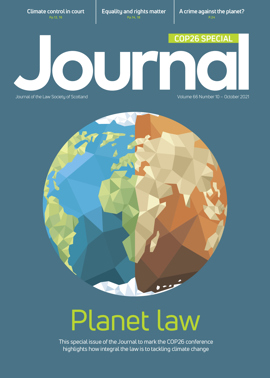Licensing: Passport to confusion
In 2003 the Nicholson Committee report declared that the “proliferation of different types of licence” was “confusing and unhelpful”, and recommended that the seven licence approach was replaced by a single premises licence. It was hailed as a progressive new approach to licensing. However, 18 years and a global pandemic later we find ourselves once again arguing over old definitions.
In November last year the Scottish Government decided that for a short time in Glasgow, only cafés could open. “Cafégate”, as it very quickly became known, saw proceedings being raised against the Glasgow Licensing Board for interdict against the issuing of prohibition notices to enforce the regulations. Interim interdict was granted while every licensing solicitor and operator in the city scratched their heads trying to interpret and apply the unhelpfully vague and unfit for purpose definition of “café”. Very quickly the matter became a moot point, as the legislation evolved to introduce the tier system and a further lockdown was eventually imposed.
What is a “nightclub”?
Fast forward 11 months and vaccine passports are on the agenda, meaning we are once again faced with new legislation based on outdated definitions of premises which in ordinary times have no legal distinction.
In Parliament the First Minister set out the definition of a nightclub for inclusion in the vaccine passport scheme: any venue that opens between midnight and 5am, serves alcohol after midnight, provides live or recorded music and has a designated space for dancing. The Health Protection (Coronavirus) (Requirements) (Scotland) Amendment (No 2) Regulations 2021 put the definition on a statutory footing. The trade reaction was intense, with concerns that such a vague definition led to unintended consequences, bringing what could be termed low-risk premises into the scope of the scheme. While nightclubs still exist in their purest form, hybrid premises and bars with entertainment are now common, and the burden of implementing a system for checking vaccine status was considered disproportionate against the risk in these venues.
The Night Time Industries Association (NTIA) also launched a legal challenge to the Scottish Government’s plans, in which it claimed that the policy was “deeply flawed and incoherent” and raised “serious issues” around discrimination and its economic impact. The judicial review sought to halt the introduction of the scheme, but Lord Burns said in dismissing the petition that it was an attempt to address “legitimate issues” of the pandemic in a “balanced way”. Rejecting the legal challenge, he noted that the plans had been signed off in principle by MSPs, and would be subject to frequent review.
Consequently at 5am on 1 October the legislation came into effect, albeit with a grace period for enforcement until 18 October. In an attempt to exclude those premises brought into the scheme unintentionally, the regulations provide that where a person responsible for premises ceases to provide one of the criteria in order to circumvent the passport requirement, they do not commit a licensing offence. This terminology is confusing and it’s difficult to comprehend a situation where it might apply.
The guidance, taken with the regulations, provides operators with more clarity on what is required from them, but raises almost as many questions as the legislation itself. What is a reasonable system for checking vaccine status? What is a compliance plan? Do you need to scan the app or will visual inspections be sufficient?
Government agenda?
The fact remains that the hospitality sector continues to face unprecedented challenges 19 months on from the first lockdown. Vaccine passports may be seen by many as the ticket to freedom, but to others they represent a further tightening of the noose held by what they feel is a Government with an anti-alcohol agenda. Emotions are high on this topic, and with the Welsh Senedd recently voting through controversial vaccine passport plans on a vote of 28 to 27, with one Conservative MS unable to participate due to technical difficulties, it only serves to highlight the continuing controversy surrounding the scheme. This is unlikely to be the last in what has been a very long series of regulations.
Recently the First Minister announced some support, with a new £25 million package for SMEs to improve ventilation and reduce the risk of COVID-19 transmission in “high risk” settings, saying: “The package will initially target higher risk sectors where people spend significant amounts of time in close proximity to each other, such as hospitality and leisure, and will make indoor settings safer, especially through the winter months.”
Regulars
Perspectives
Features
Briefings
- Criminal court: ID from CCTV
- Criminal court: Justiciary Office briefing
- Licensing: Passport to confusion
- Planning: COVID and NPFD update
- Insolvency: Winding up easier, but hurdles remain
- Tax: Government continues to bring in new taxes
- Immigration: Asylum from the Taliban?
- OPG: Update
- Property: Common parts – a welcome clarification
- In-house: Lawyer with natural energy







